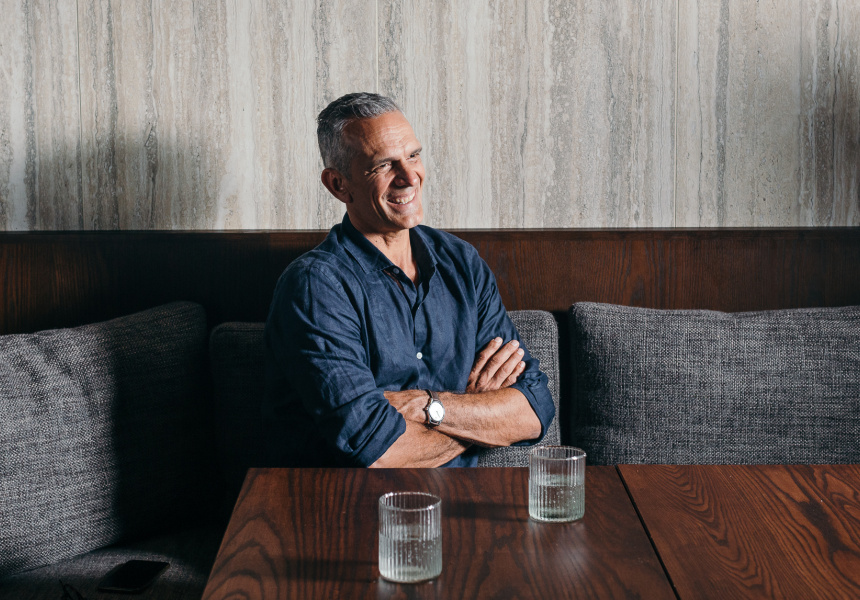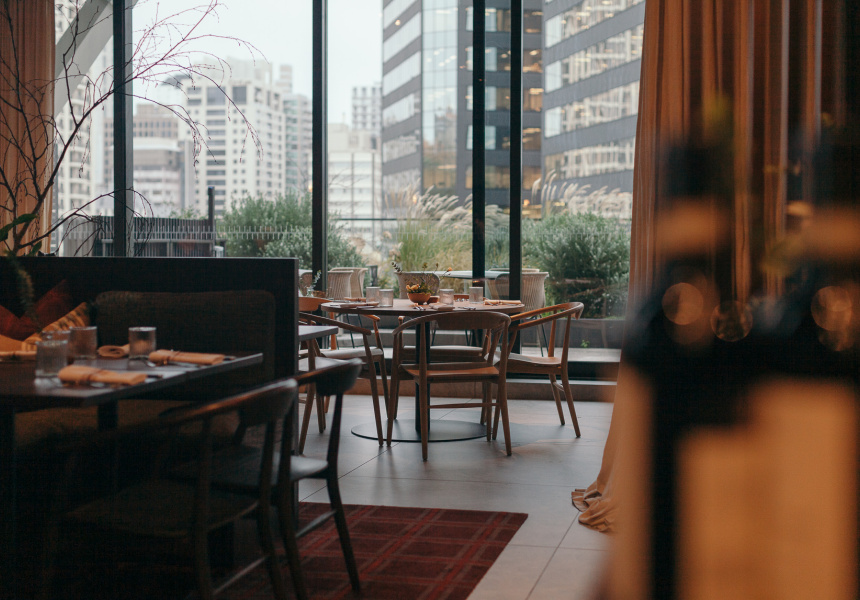In lieu of class, Josh Emett spent many of his school days meandering the tracks from his family’s Waikato beef and sheep farm, unsupervised on the old farm motorbike and tractors.
“What did you do when you’d drive around all day?” I ask, sipping a Negroni with the former Masterchef judge. It’s evening at his Auckland restaurant Onslow and his team files around us, preparing for a full service. It takes only a second for the 50-year-old to conjure unspecific memories, while more private recollections dance across his brown eyes.
“I was more destructive to myself than anyone else,” he concedes.
Never miss a moment. Make sure you're subscribed to our newsletter today.
SUBSCRIBE NOW“So, bad things?” I ask.
“Nothing bad,” he says, like a line in the dirt.
Emett did his chef training at Hamilton’s Waikato Institute of Technology, and while the road of his 30-plus years in hospitality has led him far from the farm through internationally lauded kitchens – like five-star Mayfair hotel Claridge’s and Gordon Ramsay’s Savoy Grill – his love of Aotearoa’s land and produce is a constant.
Onslow’s sleek and seductive space was designed by Rufus Knight of Knight Associates and sits at the base of The International, 9 Princes Street’s $250 million apartment project. It was the first project Emett and his wife Helen Emett had created from the ground up, and they opened in late 2020 (they’d bought The Oyster Inn on Waiheke Island from its former owners earlier that year).
The restaurant serves restrained luxury and classic sophistication, calling to mind New York’s white tablecloth establishments more than any others in town. Emett sits comfortably inside, an eye cast over staff (many of whom have been with him since opening) as they finish setting up for service.
The kitchen, helmed by head chef Glen File, will soon be sending out decadent plates of scorched tuna carpaccio in burnt butter and braised beef cheek dressed classically with horseradish and silken potato puree. Elevated snacks have quickly become fan favourites: miniature eclairs plump with crayfish; fried chicken crowned in caviar; and sausage rolls stuffed with Cambridge Farms duck. The staff take pride in old-school service and their effortless capability is warmed up just so.
With Ramsay as a mentor, three recipe books and soon-to-be three restaurants (the forthcoming Gilt Brasserie opens this spring), Emett is one of the larger names in New Zealand chef celebrity.
If you have Emett-level aspirations, you probably won’t make celebrity chefdom if cooking alone is your forte. You also must be good at business and partnership management, image maintenance, and operating several establishments – in Josh’s instance, this is thanks largely to his counterpart, Helen. Emett has it all down pat.
Gilt Brasserie at Chancery Chambers will be an ambitious addition to Auckland’s midtown once it opens on October 18. It’s a 130-seat, all-day proposition that’ll channel Parisian-themed New York City institutions such as Balthazar, The Odeon and Pastis. On the menu? The contemporary European-style food that is Emett’s specialty.
While some chefs shrink outside the confines of the kitchen, he is as comfortable in front of the camera as he is at the pass during a busy service – visibly practised at providing the lens with just the right side of his chiselled jaw. He is handsome and angular and, even in the middle of winter, bronzed. Emett is the sort you’d expect to run into in an airport business class lounge or randomly scroll past on Gwyneth Paltrow’s Instagram feed (she is a fan of his hasselback potatoes) – I’ve experienced both.
But no matter how illustrious they are, or how much media-induced fame is garnered along the way, learning the business end of restaurant ownership can be hard for any chef-owner. A chef is taught how to fix a broken sauce, not a broken kitchen culture.
Emett is the first to agree it’s challenging. “I think there are a lot of chefs that are very good with being extremely creative, but if you want to own your own business there’s so much more to it,” he says. “One of the things Gordon [Ramsay] said to me early on was ‘Go and do that [Masterchef], but the thing you’re going to do after that has to be better.’”
For Emett, that thing is ensuring his young chefs and waitstaff are educated to be proper leaders in hospitality one day.
In his experience, “it’s not easy for a chef to be open to change”; Emett feels chefs aren't “built like that”. Kitchens have historically been regimented, and so have chefs, he says. “You’re told how to do things and that’s how you learn, and if you happen to be in the right kitchen…” he trails off, calling to mind all the kitchens that happen not to be. “You’ve got to break the mould. I needed to stop being that chef that’s stuck in my ways.”
Despite Emett’s enviable CV, he enlisted a business coach to bridge the gap between chef and business owner. After 30 years in the industry, it was humbling – especially when the business coach was surprised that a celebrity chef was coming to him for advice.
“I want to own a great business, one that functions really well, one that is extremely well put together and well organised with good systems – and profitable,” he says. “You’ve got staff and you’ve actually got a responsibility to make money because they’re relying on you. There’s a whole lot of responsibility that is lumped onto your shoulders on top of everything else you have to deal with. That’s just part of owning a small business, and it’s bloody stressful.”
He's speaking from experience in more ways than one – a series of restaurants he co-founded went into voluntary administration last year, including the Southeast Asian-inspired Madam Woo venues. While they’re now back trading, Emett is no longer involved.
At Onslow, financial results are shared with the staff so they can see how the business is performing, with efforts to get them to think and act like business owners. In meetings, they discuss “stucks” – small issues like a wobbly table or the keg guy being late – where employees might find solutions.
“They’re the ones that are helping pull all the levers behind the scenes and are the cogs [who] understand where things are going right and wrong. I can’t just look at all the high-level figures and make all the judgements as to why it’s going awry in the background.”
Emett is due to give a speech to teenagers about his work the day after we meet. One of the things he’ll share is that, 30 years ago, when he chose a job in the kitchen, he also chose a certain lifestyle. “I began living a parallel life to my mates. I missed out and made sacrifice after sacrifice for many years. Missing Christmases and kids’ parties and New Year’s and everything like that.” But he doesn't regret the choice: “I love it and I’ll always love it.”
Like many chefs of his era, the type of kitchen and business Emett is running today looks different to many of those he came up in. He remembers his time with English chef Donovan Cooke at Melbourne’s iconic Est Est Est restaurant with a particular grin and affection.
The influential “rock’n’roll” take on fine dining closed in 2001, but when Emett closes his eyes and thinks of the acclaimed restaurant, he still hears the Stone Roses’ I Wanna Be Adored played at a skin-shaking pitch that made it impossible for the chefs to speak to one another. He smiles, recollecting something he chooses not to share.
Est Est Est was a group of pirates packed into a minuscule kitchen, artists carrying on feverishly for a common goal with little regard for much else. A prime example of “the old way” in hospitality. Emett recalls this without angst, suggesting that surely not all elements of the “old way” are negative. After all, they’ve made him who he is.
With a room full of customers beginning to hum around us like a happy beehive, it’s clear he’s found just the right combination of ingredients for success.



